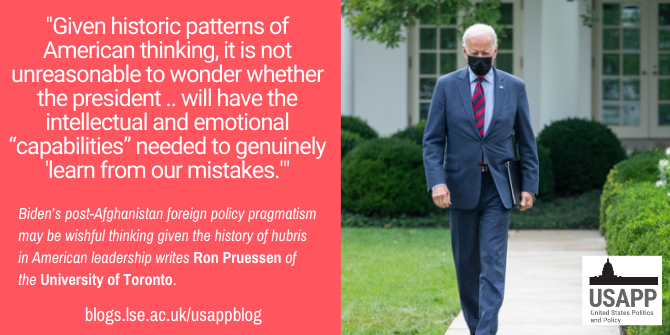 Completing the withdrawal from Afghanistan is a major foreign policy milestone in the first year of the Biden presidency. Is it promising, perilous – or pending? Ron Pruessen considers “over-the-horizon” possibilities in light of the foreign policy hubris of presidents past.
Completing the withdrawal from Afghanistan is a major foreign policy milestone in the first year of the Biden presidency. Is it promising, perilous – or pending? Ron Pruessen considers “over-the-horizon” possibilities in light of the foreign policy hubris of presidents past.
August 31, 2021: “Last night in Kabul,” President Joe Biden announced, “the United States ended 20 years of war in Afghanistan – the longest war in American history.” Such a simple sentence, such a complex moment.
The end of the no longer “endless” war will generate powerful aftershocks. These will be part of the trauma-processing required by the inability to bring as many as an additional 100,000 Afghan “allies” to safety. There will also be the inevitable (and natural) emotional strains spurred by the failure of a long and profoundly costly effort.
At the same time, Biden has real achievements to his credit on the Afghanistan front. A key example is readiness to simply say something as straightforward as “we’ve got to learn from our mistakes.” One lesson involves a key revision in ways of dealing with post-2021 challenges. “We must set missions with clear achievable goals,” Biden said, “not ones we’ll never realize.” A corollary to this: it is time to end “an era of major military operations to remake other countries.”
Such convictions were clearly encouraged by admirable sensitivity to the terrible costs accrued on the road to failure: $2 trillion (“yes, the American people should hear this: $300 million a day for two decades”) – as well as grievous burdens imposed on veterans and their families, including amputated limbs and lives (“18 veterans, on average, who die by suicide every single day”).
Learning lessons from Afghanistan and other mistakes of the past
The learning curve, however, is both fragile and partial. Given numerous and even ferocious critics, for example, do most Americans see the same lessons Biden does? Some indictments are part of the blood sport partisanship so pervasive in recent years – with “Kabul” becoming the new “Benghazi” as tensions remain high in the aftermath of the January 6 assault on the US Capitol. Other criticisms entail reasonable questions about the light the shortcomings of the evacuation throw on the state of American “intelligence” and leadership competence. Biden has been understandably defensive in responding – since there were meaningful evacuation successes – but he has also been prickly to a degree that might suggest resistance to full post-mortem disclosures.
Will the combination of flayers and doubters undercut any desire to learn from mistakes? Will the months ahead see alternative injunctions to militantly reassert US might and mission? It is not too hard, for example, to imagine something like John F. Kennedy’s call for “pay any price” vigor – prodded in 1960 by fears that “Sputnik” and a (supposed) “missile gap” with the Soviet Union portended weakness and decline.
Biden sees himself balancing toughness and pragmatism – not a new posture for him. In 2009, when Barack Obama set out to chart a winning strategy for Afghanistan, his vice-president criticized “counter-insurgency” hotheads. A strategy that required seven to ten years of costly effort, he argued, was unrealistic– given both the inability of a Kabul government to provide “an effective government presence in 40,200 villages” and the Pakistan ties of senior Taliban leaders. Surgical “counter-terrorism” seemed more realistic than nation-building.
Threats to Biden’s pragmatism
But the ground beneath Biden’s cool remedial posture is shaky for at least two reasons.
First, the president’s age may (may) mean that he will not have eight years to shape a Realpolitik legacy in which the United States carefully balances means and ends. True, he cannot be counted out. There has been movement on infrastructure initiatives, for example, which may (may) create popularity momentum and wide-margin influence. Still, Biden’s rocky first year struggle against Republican intransigence on many fronts makes it difficult to predict a Rocky Balboa victory.
A second threat to pragmatic footing resembles a partially hidden sink hole. Although he can be as cool as his image in aviator sunglasses, the 46th president also radiates heat absorbed from his country’s political and cultural heritage. That heat has always been a complicated resource. It could fuel admirable determination to fight good fights (e.g., the end of slavery, the defeat of Hitler’s Germany). Most of the world (and many Americans), however, know how the country’s heroism regularly edges into hubris – as well as appetites less than idealistic (e.g., acquisition of vast continental territories even if that entailed genocidal assaults on Native Americans).
Biden’s humbler strain of arrogance
Hubris percolates in the Biden presidency. Yes, his actions on Afghanistan shift away from the presumptions of Lyndon Johnson about Vietnam, George W. Bush about Iraq, and Barack Obama about Libya – away from ultra-confidence that the United States could defy all obstacles to getting what it wanted. (“If you look at American history,” even the Mr. Spock-like Obama once explained, seemingly hopeless problems had been solved: “as long as there were those who stayed steady and clear-eyed and persistent, eventually we came up with an answer.”)
But Afghanistan is only one significant issue among many confronting Biden – and his language is frequently less distinctively calm when the focus shifts from Central Asia to broader horizons. As New York Times journalist Frank Bruni has insightfully suggested, Biden’s is a “humbler strain of arrogance” right now. “We can own the race for the future,” was his upbeat message to the Munich Security Conference in February. His “Interim National Security Strategic Guidance” published a month later proclaimed “America is undaunted” and that it would “prevail in any strategic competition with China.” Tough talking about Beijing has become a hallmark of his administration and confirmations of the Afghan war’s end explicitly pointed to China as a 21st century challenge it would now be easier to address.

“P20210803AS-1018” by The White House is US government work
Such confidence is essentially bred in the bone for American leaders – with the risks of swaggering presumptuousness likewise inherited. Disasters in Vietnam and Iraq offer familiar examples, but the tendency to hubris is rooted even more deeply. The “manifest destiny” convictions of heavenly protection prevalent from the Puritans to the Founding Fathers and then through the 19th century gave powerful momentum to the historical and cultural legacy. That there were astonishing achievements in earlier centuries – the growth of a transcontinental state and the emergence of a global Great Power – was enough to reinforce conviction that a muscled sense of assurance was justified.
But there were also regular moments of over-confidence, with costs and consequences long predating departures from Saigon, Baghdad, and Kabul. President James Madison found support for an unsuccessful war against a vastly more powerful Great Britain in 1812, many seeing a simple key to success in a theoretically easy conquest of Canada. (Thomas Jefferson said that would be “a mere matter of marching.”) James K. Polk envisioned a quick conquest of Mexico in 1846-47, only to find that US troops faced severe supply problems and that they had paltry information about terrain and challenges south of the Rio Grande. Herman Melville’s Captain Ahab might be taken as an early critique of American arrogance – Ahab’s megalomania embodying more than fictional fatal flaws with declarations like “What I’ve dared, I’ve willed; and what I’ve willed, I’ll do. I am madness maddened. The path to my fixed purpose is laid with iron rails. Naught’s an obstacle to the iron way.”
Joe Biden has no intention of falling victim to an Ahab syndrome, of course. Concerning Afghanistan, he speaks calmly about mobilizing “over-the-horizon capabilities” to deal with eventualities. More generally, though, given historic patterns of American thinking, it is not unreasonable to wonder whether the president, his advisers, and his fellow citizens will have the intellectual and emotional “capabilities” needed to genuinely “learn from our mistakes.” That “over-the-horizon” designator carries a whiff of an adolescent Judy Garland dreaming about a rainbow just before a tornado carried her from Kansas to the fantasy land of Oz.
Please read our comments policy before commenting.
Note: This article gives the views of the author, and not the position of USAPP – American Politics and Policy, nor of the London School of Economics.
Shortened URL for this post: https://bit.ly/3nZRTWJ
About the author
 Ron Pruessen – University of Toronto
Ron Pruessen – University of Toronto
Ronald W. Pruessen has served as the Munk School of Global Affairs’ Director for International Partnerships & Research and is former Chair of the Department of History, University of Toronto. His primary research and teaching interests are in 20th century US foreign policy and international relations. Early work focused on the Cold War (e.g., John Foster Dulles: To the Threshold, 1888-1952) and he recently co-edited (with Soraya Castro) Fifty Years of Revolution: Perspectives on Cuba, the United States, and the World. His current book project is called Cakewalking with Tigers: Americans Choosing War and Making Mistakes, From John Adams to Donald Trump.






